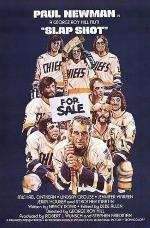 I watched the 1977 film Slap Shot the other night. It’s a George Roy Hill film, and so that’s why I decided to view it again. I didn’t like it that much as a kid, but I figured I would like it a lot more now. That wasn’t really true. But I know what I found troubling as a kid: the gratuitous violence. It is meant to be funny, but I was always very sensitive to that. And now I just don’t think it works. But I’m in the minority. A lot of people really like the film. I’m not saying that I dislike the film, however. It is just that it is deeply depressing from the vantage point of America 2015.
I watched the 1977 film Slap Shot the other night. It’s a George Roy Hill film, and so that’s why I decided to view it again. I didn’t like it that much as a kid, but I figured I would like it a lot more now. That wasn’t really true. But I know what I found troubling as a kid: the gratuitous violence. It is meant to be funny, but I was always very sensitive to that. And now I just don’t think it works. But I’m in the minority. A lot of people really like the film. I’m not saying that I dislike the film, however. It is just that it is deeply depressing from the vantage point of America 2015.
The film came out the year after Rocky and I think Hill was trying to get the same feel in Slap Shot. The home town in the film seems every bit as dirty and unpleasant as the Philadelphia in John Avildsen’s classic. Similarly, the indoor scenes are under lit, giving it a very natural feel. But it is easier to take in a drama than a comedy. Here it is oppressive. In fact, I felt oddly disconnected from the characters, who seemed to be a lot more sunny than I was feeling.
One aspect of the film that stands out is how working class it is. But it is hard not to see it as pandering. For example, Charlestown, where the Chiefs are located, is a one factory town. And that factory closes in the middle of the film, throwing 10,000 people out of work. But no mention is made of this later in the film. The town doesn’t seem to have been affected by it. And the people on the team are just interested in getting bought by someone else, so they can continue to play in some other town. That’s understandable, but there is absolutely no solidarity.
Maybe that’s the way it should be. Films reflect the society. And 1977 was the leading edge of America’s hard right turn. People tend to think that things started to go bad under Reagan. That’s not true. The social decay and the destruction of the middle class really took off under Reagan, but it was Carter who started the whole neoliberal process with its deregulation. If Slap Shot has a theme, it is that everyone is so desperate that they don’t have the ability to care about anyone else.
This is most demonstrated in Paul Newman’s character, Reggie Dunlop. He isn’t so much callous towards others as he is just lost in his own fantasies. Throughout the film, there is a subplot about Dunlop trying to get back together with his wife, Francine, played by Jennifer Warren. At the end, Francine is moving to New York because business is so bad in Charlestown — the only (implicit) acknowledgement of the town’s economic problems. Dunlop is going on to coach another team in Minnesota. When Dunlop is asked if Francine will be coming to join him, he says, “Oh, for sure!” But of course, she isn’t. And he knows it. Your dreams only take you so far. In 1977, it was possible to still have dreams. It is 38 years later, and dreams seem like a quaint affectation of a bygone era. There are no more factories to close. No more wives to win back. No more jobs waiting in another town.
No wonder I didn’t find Slap Shot very fun. It was created at the start of our hopelessness. When Dunlop looks out at his wife as she drives away, he’s looking decades into the future. He sees that it doesn’t get better.





